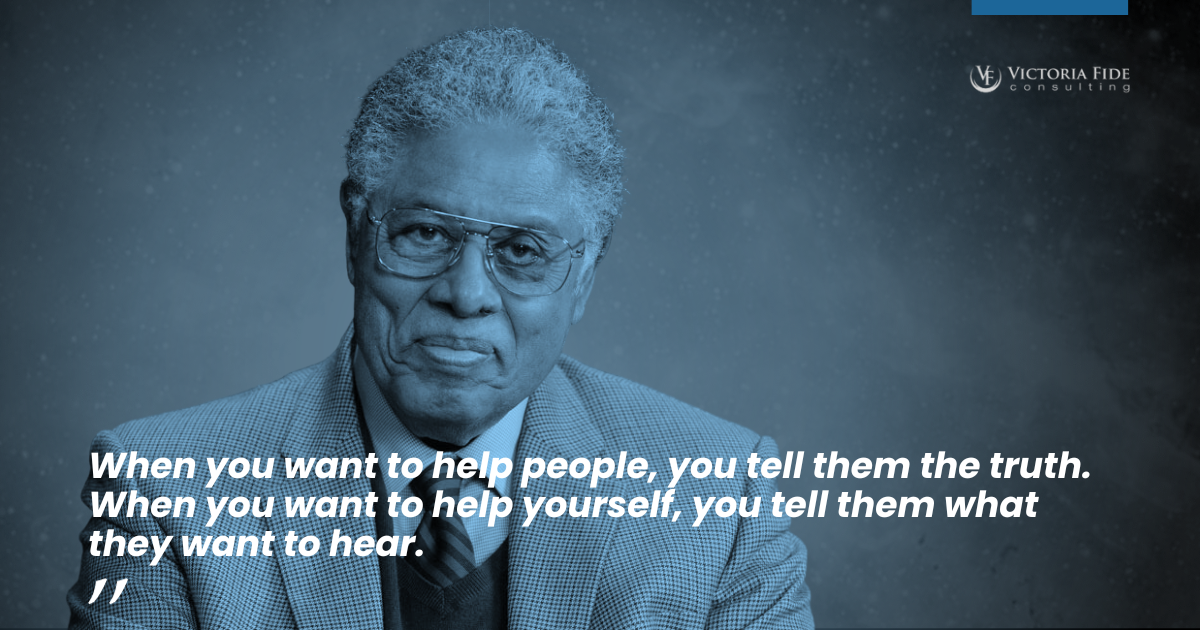
Budgeting for Digital Transformation: The Power of Truth in Achieving Success
The Sage Wisdom series is produced by Victoria Fide Marketing with input and oversight from our leadership team and industry SMEs.
Thomas Sowell is a renowned American economist, social theorist, and prolific author, known for his influential work in the fields of economics, politics, and social policy. He has held positions at prestigious institutions like Stanford University’s Hoover Institution and is celebrated for his rigorous analytical approach to complex societal issues. Sowell’s work often challenges prevailing ideologies and emphasizes the importance of empirical evidence and sound economic principles in shaping public policy and fostering genuine progress.
Sowell once said, “When you want to help people, you tell them the truth. When you want to help yourself, you tell them what they want to hear.” This quote highlights Sowell’s commitment to intellectual honesty and the idea that genuine assistance to individuals and societies requires addressing harsh realities, even when they may be uncomfortable or unpopular.
When preparing for a digital transformation (DX), it can be easy for project leaders to feel pressured to give an estimate that fits within the organization’s budget. Nobody wants to hear that they can’t get what they want with the amount that they want to spend. However, it doesn’t do any good to create a budget based on what an organization wants to spend if they can’t accomplish the desired outcome within that budget. For project leaders who truly wish to help their organization, it is necessary to tell the truth and speak plainly about what is and isn’t possible within the proposed budget.
This article will explore the pressure project leaders face to align project estimates with organizational leaders’ desired budgets. By uncovering the psychological interplay between expectations and reality, we will find positive techniques for effectively navigating difficult conversations in a way that will strengthen trust between project leaders and organizational leaders, ultimately promoting a culture of transparency, integrity, and genuine progress.
The Temptation of Conforming to Organizational Leadership Expectations
Project leaders tasked with piloting a digital transformation (DX) initiative often find themselves wrestling with the weighty pressure to align their project budgets with the expectations of organizational leaders. This predicament can be attributed to various factors, such as the project leader’s fear of appearing incapable of delivering when presenting an honest budget. The temptation to underestimate costs, resources, and timelines often creeps in, as project leaders worry that a candid budget might be met with skepticism or resistance from higher-ups.
Additionally, there is a strong desire to maintain the respect and trust of company leadership by accommodating their financial expectations. However, downplaying potential challenges or complexities to ensure their budget aligns with the organizational objectives can ultimately jeopardize the project’s integrity.

Free PDF Download
In the rapidly changing digital landscape, more and more companies are desperately trying to keep up with the competition. Download “The 10 Biggest Mistakes Businesses Make in Digital Transformation” for free today to learn how to use DX to radically transform your business and gain an edge over your competitors.
Despite the discomfort of candid conversations about the true budget requirements, avoiding such discussions upfront will only lead to significantly increased issues further down the project timeline. In such cases where the budget proves inadequate, the project will experience disruptions, delays, and even project failure or abandonment.
Moreover, this people-pleasing approach erodes trust between project leadership and organizational leadership, as it sets a precedent of hiding essential information, falling short of expectations, and failing to follow through on commitments. Project leaders who desire a successful initiative must embrace the value of a careful and candid budget assessment.
The Value of Candid Assessments
Project leaders serve as the stewards of their project success, and their ability to provide truthful assessments is paramount. Their role extends beyond mere management; they are expected to be experts in the project’s complexities, risks, requirements, and scope. This in-depth knowledge enables them to accurately assess the budget necessary to the project’s successful completion and the achievement of the organization’s business objectives.
The positive ripple effect of trust-building between the organizational leadership and project leadership throughout the project lifecycle cannot be understated. A culture of openness and honesty leads to smoother collaboration, problem-solving, and decision-making.
In addition to benefiting the organization’s integrity, candid assessments play a pivotal role in enabling informed decisions. When project leaders provide candid estimations, executive leaders are empowered to make choices that align with their organization’s strategic objectives. For instance, they can choose to either delay projects until they secure a larger budget, or they can choose to prioritize budget adjustments to meet the project’s needs.
This flexibility in decision-making can be a game-changer, ensuring that resources are allocated efficiently and effectively not just within the project itself, but throughout the entire company. Realistic budgeting and planning significantly increase the likelihood of project success, as they lay the groundwork for effectively addressing challenges, enabling genuine progress, and achieving project goals.
The Psychological Dynamics of Truth and Expectation
Confirmation bias, the inclination to favor information that aligns with preexisting beliefs, significantly impacts how we process data. It’s a natural human tendency to gravitate toward information that aligns with our existing viewpoints while disregarding or downplaying information that challenges them. In the context of establishing an estimate for a DX initiative, project leaders must be aware of their possible confirmation bias by objectively weighing the different factors that affect the project’s budgets.
When the project budget surpasses organizational expectations, sharing uncomfortable truths is crucial. Though challenging, this honesty fosters trust and secures long-term success more effectively than merely accommodating leadership desires in the short term. To navigate the delicate task of delivering unwelcome truths, it’s essential to employ a combination of effective communication techniques:
- Build trust first through active listening: Begin by actively listening to the concerns, viewpoints, and emotions of the organizational leadership. Acknowledge their perspective and demonstrate empathy. By showing that you understand and respect their position, you can create a foundation of trust that makes them more receptive to your message.
- Provide evidence and context: Support your message with concrete data, facts, and examples. By presenting well-documented evidence, you can demonstrate that your message is rooted in objective reality rather than subjective opinion. This can help in reducing resistance by appealing to reason and rationality.
- Offer alternatives or solutions: While delivering unwelcome truths, it’s vital to convey your commitment to the organization’s success. Suggest alternative approaches or solutions that can address the challenges or issues raised. This may look like suggesting a phased approach, submitting an adjusted project scope, or presenting lower-cost workarounds until the organization is ready to invest the necessary funds.

Transformation is not easy, but it doesn’t have to be impossible. Take control of your project’s success today and schedule a free 30-minute consultation to find out how Victoria Fide can equip you for transformational success.
Above all, keep Sowell’s wisdom in mind: “When you want to help people, you tell them the truth. When you want to help yourself, you tell them what they want to hear.” Being transparent and candid up front will always be more beneficial than attempting to tell others what they want to hear.
Key Factors in Accurate DX Budgeting
While there is not enough time in this article to sufficiently dive into all the aspects of accurate DX budgeting, there are a few key factors to keep in mind.
The biggest factor is the scope and intricacy of the transformation. Will the project require a comprehensive overhaul of systems and processes, or is it a more focused initiative targeting specific areas? A clearly defined scope enables more accurate financial estimation. In addition, what are the required technology or infrastructure requirements? Investing in new software, hardware, cloud services or other IT resources will play a large role in establishing a budget.
In addition to scope and technology requirements, you must evaluate the availability of your current team members, their skills, and additional resources required to execute the DX project. It may be necessary to augment your staff to help carry out the responsibilities of day-to-day operations during the project lifecycle. Considering the statistics that prove 70% of digital transformation projects fail, you may also want to consider hiring expert DX consultants like Victoria Fide Consulting that specialize in guiding your project successfully across the finish line.
And finally, no project goes exactly according to plan. It is wise to build a contingency reserve into the budget that accounts for potential risks and setbacks. A carefully planned reserve serves several vital purposes, including risk mitigation, client and stakeholder confidence, and adaptability. Consider conducting a comprehensive risk assessment to identify potential threats and determine an appropriate size of the reserve.
The Role of Leadership in Encouraging Budget Planning Transparency
In any organization, leadership plays a pivotal role in shaping the culture, especially when it comes to integrity. The way leaders conduct themselves and the values they espouse have a profound impact on the organization’s approach to honesty and open communication. Employees, in turn, feel empowered to share their thoughts and concerns openly, knowing that their input will be valued and respected. This not only enhances the quality of decision-making within the organization but also contributes to a healthier, more positive work environment.
Organizational values play a significant role in promoting a culture of honesty. When an organization’s core values emphasize integrity, transparency, and ethical conduct, it sends a clear message that truth-telling is not just a practice but a deeply ingrained part of the company’s identity. It is a leader’s role to uphold these values and lay the foundation for others to champion them more easily in their everyday interactions.

Maximizing DX Success through Candid Budgeting
Thomas Sowell’s wisdom, “When you want to help people, you tell them the truth. When you want to help yourself, you tell them what they want to hear,” serves as a guiding principle for project leaders and organizations embarking on a digital transformation initiative. Project leaders often feel pressured to align budgets with organizational expectations, but underestimating costs can lead to project disruptions and a breakdown of trust.
Candid assessments and clearly communicating what is and isn’t possible within the organization’s desired spend is essential to project success. By employing techniques such as building trust through active listening, using data to support a proposed budget, and offering creative solutions or workarounds, project leaders can maintain integrity while working to find the best solution for their organization. This dedication to transparency fosters open communication and ultimately contributes to more informed decision making and genuine progress in DX initiatives, setting a strong foundation for organizational success in the transformational technology initiative and beyond.
Subscribe to our weekly LinkedIn Digital Transformation Success newsletter and get notified of each new edition.
